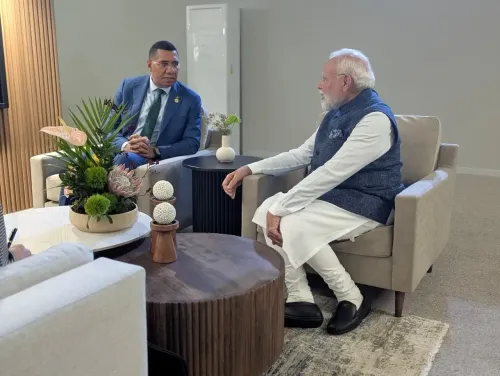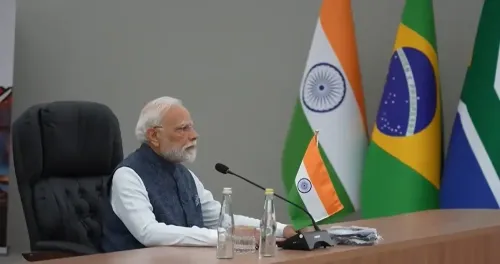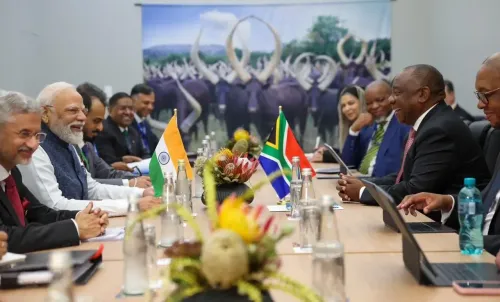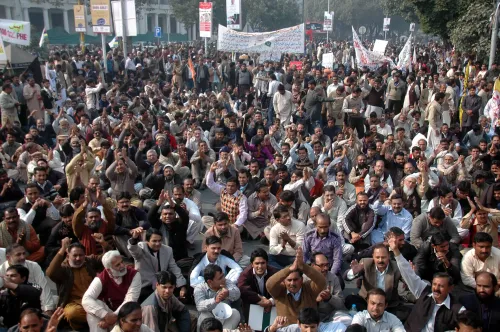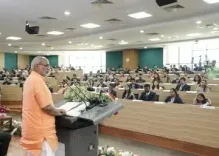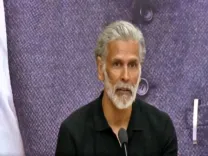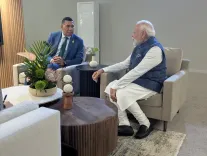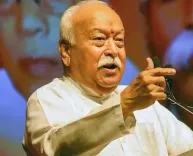What Happened at the IBSA Leaders' Meeting in Johannesburg?
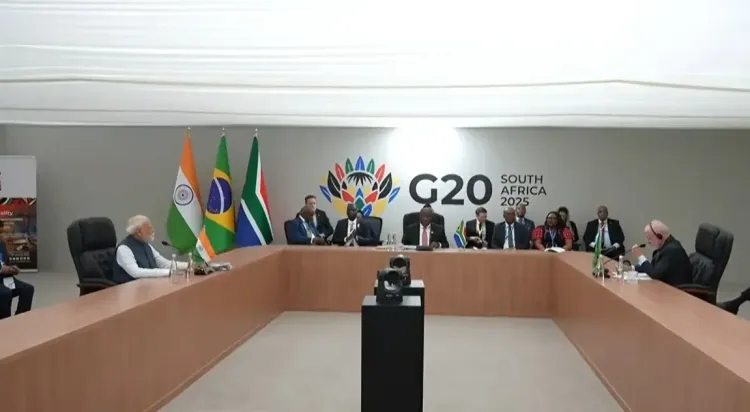
Synopsis
Key Takeaways
- PM Modi emphasized the importance of trilateral cooperation among India, Brazil, and South Africa.
- The meeting focused on addressing issues faced by the Global South, particularly food security.
- Leaders discussed disaster management strategies and the need for a development-centric model.
- A proposal for a G20 Open Satellite Data Partnership was introduced to aid developing countries.
- Strengthening bilateral relations between India and South Africa was a priority during this meeting.
Johannesburg, Nov 23 (NationPress) Prime Minister Narendra Modi participated in the India-Brazil-South Africa (IBSA) Leaders’ Meeting this Sunday in Johannesburg, where he focused on enhancing trilateral collaboration and the dedication of the involved nations to the Global South.
Also attending the meeting were Brazilian President Luiz Inacio Lula da Silva and South African President Cyril Ramaphosa.
Currently, South Africa chairs the IBSA. This unique forum connects India, Brazil, and South Africa, three significant democracies and major economies across different continents, facing analogous challenges, as explained by the Ministry of External Affairs (MEA). The grouping was officially formed and designated the IBSA Dialogue Forum when the Foreign Ministers convened in Brasilia on June 6, 2023, and released the Brasilia Declaration.
During a special media briefing on PM Modi's visit to South Africa on November 20, Sudhakar Dalela, Secretary (Economic Relations) at the MEA, remarked, "As you are aware, India, Brazil, and South Africa represent three democracies from three continents, all part of the Global South. We have established a distinctive forum for coordination around three main pillars: political coordination, trilateral cooperation including people-to-people relations, and our collective efforts as IBSA to support Global South countries, especially regarding food security and hunger through the IBSA fund."
"This meeting, although brief and occurring alongside a summit, will allow the three leaders to review our recent efforts across these three cooperation pillars. Notably, in September, during the UNGA in New York, the IBSA foreign ministers convened and issued a statement on ongoing themes of mutual interest," he continued.
On Sunday, PM Modi also met with President Ramaphosa during the G20 Leaders Summit in Johannesburg. A video shared on X showed the two leaders warmly greeting each other prior to their discussion.
Present at the meeting were External Affairs Minister (EAM) S. Jaishankar, MEA Secretary (Economic Relations) Sudhakar Dalela, and other officials.
South Africa's Presidency shared a video of the meeting on X, stating, "His Excellency President Cyril Ramaphosa is engaged in a bilateral meeting with His Excellency Prime Minister Narendra Modi of the Republic of India on the margins of the G20 Leaders' Summit hosted by South Africa in Johannesburg EXPO Centre, Gauteng."
This morning’s meeting offered a chance to re-engage positively, enhance bilateral relations, and discuss mutually beneficial initiatives in trade, industrialization, education, ICT, and infrastructure development," it continued.
On Saturday, Ramaphosa extended a warm welcome to PM Modi upon his arrival for the G20 Leaders' Summit at Nasrec in Johannesburg.
In his remarks at the opening sessions of the G20 Leaders' Summit, PM Modi emphasized the necessity for enhanced global collaboration, disaster resilience, and sustainable development.
Through a series of posts on X, and based on detailed comments from the Prime Minister's Office, PM Modi highlighted India's human-centric growth approach and urged the group to adopt new development parameters that harmonize progress with planetary health.
On X, the Prime Minister noted that the second session of the Summit concentrated on building resilience against disasters and climate change, promoting equitable energy transitions, and fortifying global food systems. "India is actively engaged on all these fronts, constructing a future that is inclusive and human-centric," he stated.
Reaffirming India's longstanding belief that major global issues necessitate coordinated solutions, PM Modi mentioned that this conviction led to India's establishment of the Disaster Risk Reduction Working Group during its G20 presidency. He suggested that disaster management should transition from a solely "response-centric" to a "development-centric" model, referencing the Coalition for Disaster Resilient Infrastructure as a case in point.
Furthermore, the Prime Minister proposed the formation of a G20 Open Satellite Data Partnership, aimed at enhancing accessibility to satellite data and analyses from G20 space agencies for developing nations, particularly in the Global South. He stressed that improved access to space-based resources would benefit countries in sectors like agriculture, fisheries, and disaster management.

